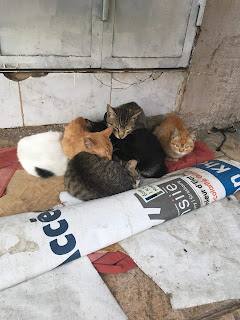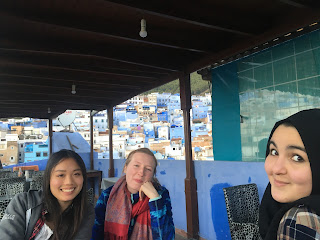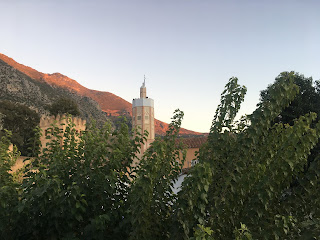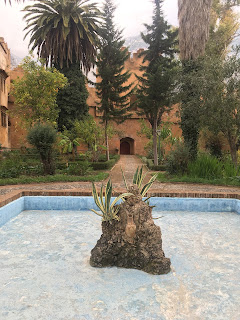About six of us (international students) had the same first flight at 4:55am from Fes airport. Therefore, the best price for a grand taxi was found through the University. We paid for a University 15 seater van. This came in handy for three reasons: we had plenty of room for our luggage and to sit comfortably; there was heate in the car (as it was winter and freezing); we were able to leave from the University at around midnight.
Our trip began at around midnight as we piled into the van. I get extremely nervous before I have to travel through airports. So many things can go wrong. Therefore, I could not sleep on the hour and a half ride to the airport. Everyone else drifted to sleep as I stared out the foggy window. My mind drifted to thoughts of how amazing this opportunity was and what returning to home would be like. We finally made it to the airport, but no one else was there. You could tell our monochronic tendencies had already started to reappear strongly. Monochronic is a cultural behavior in which society is very timely (aka on-time is late) and people tend to form lines. This is found in the USA. However, Morocco is a polychronic society--there are more clusters than lines and things will get done when they get done. This was prominent as we showed up about three hours early to the airport. For most international flights, this is the recommended time frame. However, in the Fes airport, the workers didn't start to show up and let us start through security until about an hour before our flight was due to take off.
Before I knew it, I was watching the sunrise as I left Morocco. My first layover was in Paris. Once you leave Morocco, it becomes very uncommon to say "Assalamu Alaykum" (Peace be with you", "Wa Alaykum Assalam" (and peace be with you), and "Shukran" (thank you). In fact, when I slipped and said those phrases, I got some strange looks in the airport. It has taken about a week to readjust to the lack of Arabic and Muslim culture back home.
When I finally landed state-side, I discovered that my luggage would not be checked all the way to Arizona. In the Detroit airport, I had to run from the landing plane to the passport control only to discover that I might still miss my flight. It may be a rookie mistake, but I was told by my airline that my bags would be checked all the way through. Instead, I was caught searching for my bags on the luggage carousel. I found my backpacking backpack first, then my new pink suitcase. I quickly grabbed them and rushed toward customs. One step into my rush and the wheels on the pink suitcase broke off.
Now, I was dragging my pink suitcase, loaded down with all of my other bags, and carrying the wheels with my pinky. At this point, I was snatching looks at my watch realizing that I had a very short amount of time to get to my connection. Flustered, hot, annoyed, and worried, I hoisted my pink suitcase up to the men at the customs' station and ungracefully gave them my backpack. Both of which were much too heavy to handle with a lack of sleep. Finally, after running through the airport once again, I made it to my final plane.
For instance, when the sunset begins, we drop what we are doing and take sunset walks. This is mostly a tradition started by my grandmother because she loves sunsets.
Christmas day came along, we spend time together, and of course, took a family photo. I loved Morocco with the numerous learning experiences and adventures, but I sure did miss my family and friends. However, now, I have an entire country to miss and many new friends that I hope to meet again in the future.
As I went back to university life at Northern Arizona University, I noticed a few more 'reverse culture shock' moments. For instance, I feel as if students are not wearing nearly enough clothing and I forgot how many amazingly bright and diverse hair colors people rock. I think that I will readjust pretty quickly and also enjoy noticing aspects of my society that I didn't realize existed before. One of my professors in Morocco explained that people don't see a lot of aspects of their own society until they have seen another and returned to their own. Now, I know that is very true because I see many things that would have passed right over my head before.





























































